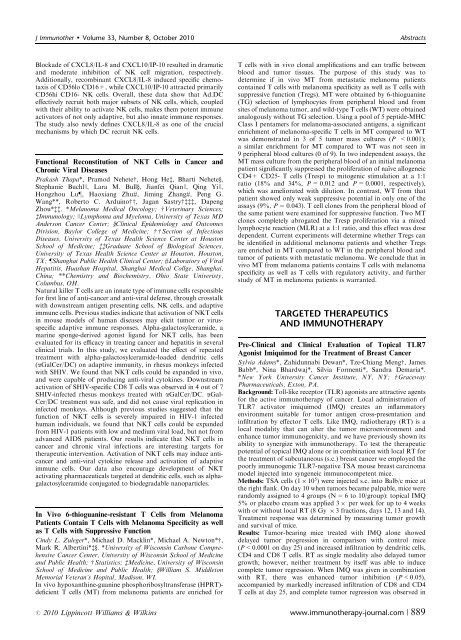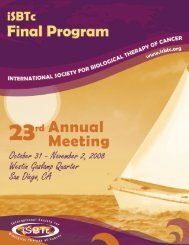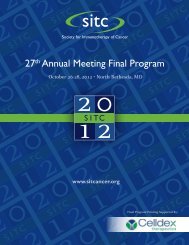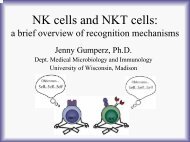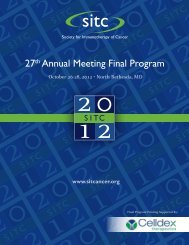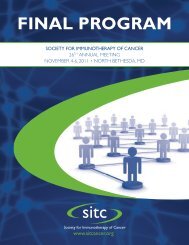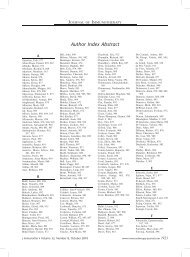Abstracts for the 25th Annual Scientific Meeting of the International ...
Abstracts for the 25th Annual Scientific Meeting of the International ...
Abstracts for the 25th Annual Scientific Meeting of the International ...
Create successful ePaper yourself
Turn your PDF publications into a flip-book with our unique Google optimized e-Paper software.
J Immuno<strong>the</strong>r Volume 33, Number 8, October 2010<br />
<strong>Abstracts</strong><br />
Blockade <strong>of</strong> CXCL8/IL-8 and CXCL10/IP-10 resulted in dramatic<br />
and moderate inhibition <strong>of</strong> NK cell migration, respectively.<br />
Additionally, recombinant CXCL8/IL-8 induced specific chemotaxis<br />
<strong>of</strong> CD56lo CD16+, while CXCL10/IP-10 attracted primarily<br />
CD56hi CD16- NK cells. Overall, <strong>the</strong>se data show that Ad.DC<br />
effectively recruit both major subsets <strong>of</strong> NK cells, which, coupled<br />
with <strong>the</strong>ir ability to activate NK cells, makes <strong>the</strong>m potent immune<br />
activators <strong>of</strong> not only adaptive, but also innate immune responses.<br />
The study also newly defines CXCL8/IL-8 as one <strong>of</strong> <strong>the</strong> crucial<br />
mechanisms by which DC recruit NK cells.<br />
Functional Reconstitution <strong>of</strong> NKT Cells in Cancer and<br />
Chronic Viral Diseases<br />
Prakash Thapa*, Pramod Nehetew, Hong Hez, Bharti Nehetey,<br />
Stephanie BuchlJ, Lara M. Bully, Jianfei QianJ, Qing YiJ,<br />
Hongzhou Luz, Haoxiang Zhu#, Jiming Zhang#, Peng G.<br />
Wang**, Roberto C. Arduinoww, Jagan Sastrywzzz, Dapeng<br />
Zhou*zz. *Melanoma Medical Oncology; w Veterinary Sciences;<br />
zImmunology; JLymphoma and Myeloma, University <strong>of</strong> Texas MD<br />
Anderson Cancer Center; yClinical Epidemiology and Outcomes<br />
Division, Baylor College <strong>of</strong> Medicine; wwSection <strong>of</strong> Infectious<br />
Diseases, University <strong>of</strong> Texas Health Science Center at Houston<br />
School <strong>of</strong> Medicine; zzGraduate School <strong>of</strong> Biological Sciences,<br />
University <strong>of</strong> Texas Health Science Center at Houston, Houston,<br />
TX; zShanghai Public Health Clinical Center; #Laboratory <strong>of</strong> Viral<br />
Hepatitis, Huashan Hospital, Shanghai Medical Collge, Shanghai,<br />
China; **Chemistry and Biochemistry, Ohio State Univeristy,<br />
Columbus, OH.<br />
Natural killer T cells are an innate type <strong>of</strong> immune cells responsible<br />
<strong>for</strong> first line <strong>of</strong> anti-cancer and anti-viral defense, through crosstalk<br />
with downstream antigen presenting cells, NK cells, and adaptive<br />
immune cells. Previous studies indicate that activation <strong>of</strong> NKT cells<br />
in mouse models <strong>of</strong> human diseases may elicit tumor or virusspecific<br />
adaptive immune responses. Alpha-galactosylceramide, a<br />
marine sponge-derived agonist ligand <strong>for</strong> NKT cells, has been<br />
evaluated <strong>for</strong> its efficacy in treating cancer and hepatitis in several<br />
clinical trials. In this study, we evaluated <strong>the</strong> effect <strong>of</strong> repeated<br />
treatment with alpha-galactosylceramide-loaded dendritic cells<br />
(aGalCer/DC) on adaptive immunity, in rhesus monkeys infected<br />
with SHIV. We found that NKT cells could be expanded in vivo,<br />
and were capable <strong>of</strong> producing anti-viral cytokines. Downstream<br />
activation <strong>of</strong> SHIV-specific CD8 T cells was observed in 4 out <strong>of</strong> 7<br />
SHIV-infected rhesus monkeys treated with aGalCer/DC. aGal-<br />
Cer/DC treatment was safe, and did not cause viral replication in<br />
infected monkeys. Although previous studies suggested that <strong>the</strong><br />
function <strong>of</strong> NKT cells is severely impaired in HIV-1 infected<br />
human individuals, we found that NKT cells could be expanded<br />
from HIV-1 patients with low and medium viral load, but not from<br />
advanced AIDS patients. Our results indicate that NKT cells in<br />
cancer and chronic viral infections are interesting targets <strong>for</strong><br />
<strong>the</strong>rapeutic intervention. Activation <strong>of</strong> NKT cells may induce anticancer<br />
and anti-viral cytokine release and activation <strong>of</strong> adaptive<br />
immune cells. Our data also encourage development <strong>of</strong> NKT<br />
activating pharmaceuticals targeted at dendritic cells, such as alphagalactosylceramide<br />
conjugated to biodegradable nanoparticles.<br />
In Vivo 6-thioguanine-resistant T Cells from Melanoma<br />
Patients Contain T Cells with Melanoma Specificity as well<br />
as T Cells with Suppressive Function<br />
Cindy L. Zuleger*, Michael D. Macklin*, Michael A. Newton*w,<br />
Mark R. Albertini*zy. *University <strong>of</strong> Wisconsin Carbone Comprehensive<br />
Cancer Center, University <strong>of</strong> Wisconsin School <strong>of</strong> Medicine<br />
and Public Health; w Statistics; zMedicine, University <strong>of</strong> Wisconsin<br />
School <strong>of</strong> Medicine and Public Health; yWilliam S. Middleton<br />
Memorial Veteran’s Hopital, Madison, WI.<br />
In vivo hypoxanthine-guanine phosphoribosyltransferase (HPRT)-<br />
deficient T cells (MT) from melanoma patients are enriched <strong>for</strong><br />
T cells with in vivo clonal amplifications and can traffic between<br />
blood and tumor tissues. The purpose <strong>of</strong> this study was to<br />
determine if in vivo MT from metastatic melanoma patients<br />
contained T cells with melanoma specificity as well as T cells with<br />
suppressive function (Tregs). MT were obtained by 6-thioguanine<br />
(TG) selection <strong>of</strong> lymphocytes from peripheral blood and from<br />
sites <strong>of</strong> melanoma tumor, and wild-type T cells (WT) were obtained<br />
analogously without TG selection. Using a pool <strong>of</strong> 5 peptide-MHC<br />
Class I pentamers <strong>for</strong> melanoma-associated antigens, a significant<br />
enrichment <strong>of</strong> melanoma-specific T cells in MT compared to WT<br />
was demonstrated in 3 <strong>of</strong> 5 tumor mass cultures (P


